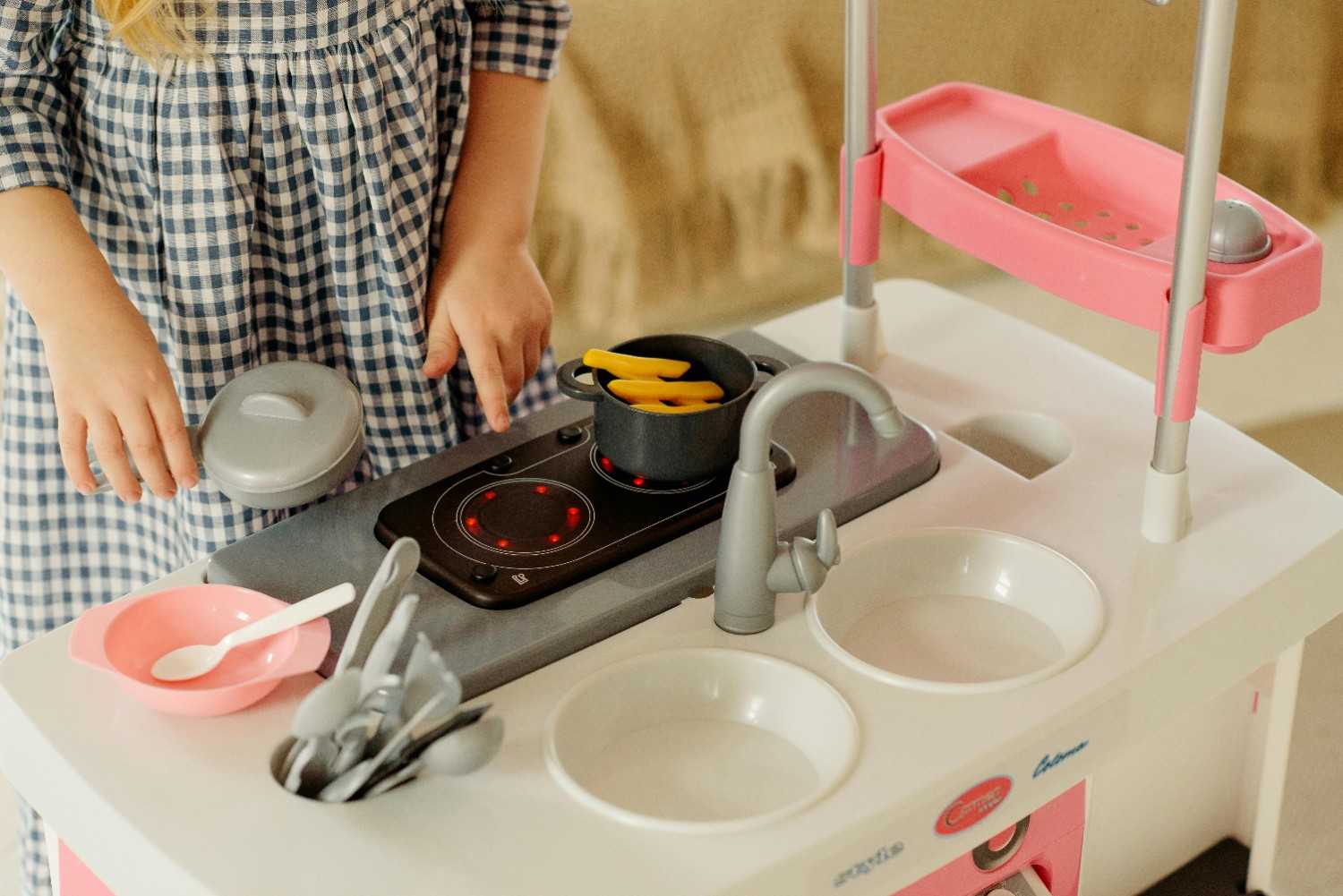
Introduction
Children love to imitate their parents. Whether it’s cooking, cleaning, or organizing, they observe and repeat what they see. That’s why a play kitchen is a fantastic way to introduce kids to real-life activities while keeping them engaged in a safe environment. At Totdot, we believe in the power of play, and a play kitchen is the perfect tool to help children learn essential skills. But how does a play kitchen compare to a real kitchen? Let’s explore how both contribute to a child’s development.
1. Safe Exploration of Real-Life Skills
A real kitchen has sharp knives, hot surfaces, and breakable items. It’s not always safe for toddlers to explore freely. A play kitchen provides a controlled space where kids can pretend to cook, bake, and organize. This kind of role-playing helps them understand basic kitchen tasks without the risks involved in a real kitchen.
2. Encourages Creativity and Imagination
In a real kitchen, there are rules to follow. Ingredients need to be measured, and recipes must be followed. A play kitchen, on the other hand, allows kids to get creative. They can mix pretend ingredients, serve imaginary meals, and create their own restaurant. This open-ended play strengthens their imagination and problem-solving skills.
3. Develops Fine Motor Skills
Handling kitchen tools requires coordination. Kids improve their motor skills by stirring, chopping with toy knives, and setting up plates in their play kitchen. These activities help them develop dexterity, grip strength, and hand-eye coordination, preparing them for real kitchen tasks in the future.
4. Teaches Organization and Responsibility
Keeping a kitchen tidy is an important skill. A play kitchen teaches kids the importance of organization. They learn to put away utensils, arrange their toy food, and clean up after playtime. These habits translate to real-life responsibility, helping them become more independent.
5. Enhances Social Skills
A play kitchen is great for group play. When kids play together, they take turns, assign roles, and learn to share. Whether they’re pretending to be chefs, waiters, or customers, they develop communication skills and teamwork, essential for social interactions in the real world.
6. Introduces Basic Math Concepts
Cooking involves numbers—measuring ingredients, counting eggs, and setting timers. A play kitchen introduces kids to these basic math concepts in a fun way. They practice counting, sorting, and recognizing shapes through their play activities.
7. Builds Confidence for Real Kitchen Tasks
When kids get comfortable in a play kitchen, they become more confident in a real kitchen. They can transition to simple real-life tasks, like washing vegetables or mixing batter. This hands-on experience makes them more eager to help out and learn real cooking skills over time.
8. A Perfect Pairing with Other Essentials
A child’s daily routine isn’t complete without the right accessories. Just like a boys rompers outfit is perfect for playtime comfort, a play kitchen is essential for interactive learning. Both provide freedom of movement and creativity, making playtime more enjoyable.
9. Encourages Healthy Eating Habits
When kids pretend to cook, they learn about different food groups. A play kitchen lets them explore fruits, vegetables, and other healthy ingredients. This early exposure helps them develop positive eating habits and an interest in real food preparation.
10. Less Screen Time, More Active Play
With technology taking over, keeping kids engaged in active play is a challenge. A play kitchen offers an alternative to screens. Instead of watching videos, kids engage in hands-on activities that stimulate their minds and bodies.
11. Customizable and Long-Lasting Fun
Unlike electronic toys that lose their appeal, a play kitchen grows with your child. At Totdot, we offer durable and thoughtfully designed kitchens that can be customized with new accessories. Kids can expand their play with different toy food sets, utensils, and pretend appliances.
12. Strengthens Parent-Child Bonding
Playing together strengthens family bonds. Parents can join their children in their play kitchen, guiding them through pretend recipes and meal planning. This interaction fosters communication, builds trust, and creates wonderful childhood memories.
Final Thoughts
A play kitchen is more than just a toy. It’s an investment in your child’s growth, creativity, and learning. At Totdot, we believe in providing high-quality, engaging playsets that help children develop real-world skills in a fun and safe way. Pair it with a comfy boys rompers outfit for the perfect playtime experience. Let your little one explore, imagine, and learn with a play kitchen today!





Leave a Reply